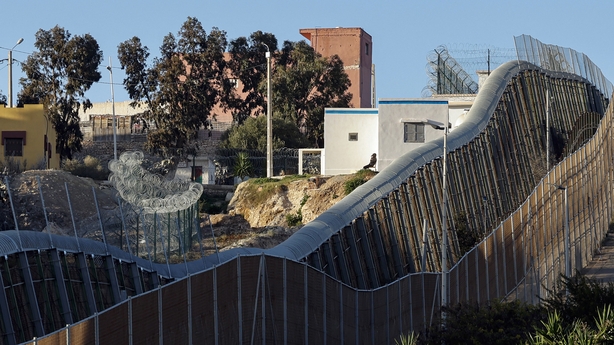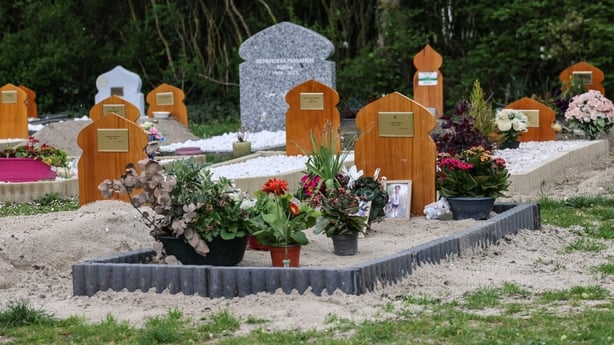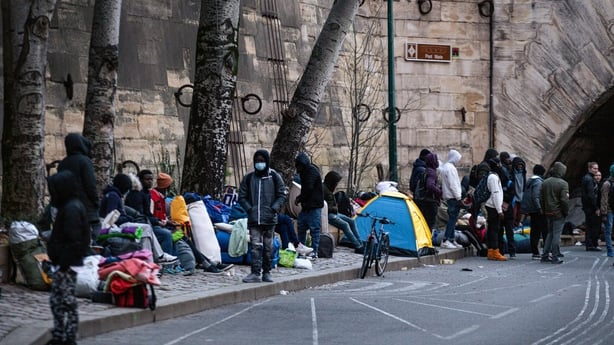MEPs have approved a revamped migration system that the pro-EU political centre promises would reduce irregular arrivals as it seeks to stem gains by the far right ahead of the bloc's parliamentary election in June.
It aims to cut the times for security and asylum procedures at external EU borders and increase returns to reduce unwanted immigration from the Middle East and Africa, a high priority on the bloc's agenda.
After eight years of feuds between the bloc's 27 member states, the compromise proposals lay out a delicate balance between the obligations of arrival countries such as Italy and help from rich destinations such as Germany.
But it has been squarely criticised by anti-immigration, eurosceptic and far-right parties for not going far enough to stop migration, while leftists and rights activists have lambasted it as a major blow to human rights.
We need your consent to load this rte-player contentWe use rte-player to manage extra content that can set cookies on your device and collect data about your activity. Please review their details and accept them to load the content.Manage Preferences
"We will be able to better protect our external borders, the vulnerable and refugees, swiftly return those not eligible to stay, with mandatory solidarity between member states," said top EU migration official, Home Affairs Commissioner Ylva Johansson.
The vote came as the broad political EU centre feels under pressure from the far right, which is expected to gain seats in the bloc-wide European Parliament election in two months.
We need your consent to load this rte-player contentWe use rte-player to manage extra content that can set cookies on your device and collect data about your activity. Please review their details and accept them to load the content.Manage Preferences
Migration has been a hot-button issue since more than a million people - mostly Syrian refugees - arrived across the Mediterranean in 2015, catching the EU unprepared.
The EU has since tightened its borders and asylum laws to prevent any repeat of the chaos, and vows to stay the course.
Long implementation
More than 46,000 people have entered the wealthy bloc of some 450 million inhabitants so far this year outside of regular border crossings, according to UN data. Some 400 people are estimated to have perished while attempting to get in.
"The EU is demonstrating that united, we can establish this needed reform," said the head of the liberal faction, Valérie Hayer.
"Now, it is all about the implementation," she said, adding that was the responsibility of the member states and that human rights violations must be punished.
The vote was briefly interrupted by protesters in public galleries calling on the lawmakers to "Vote no!", while rights groups expressed criticism of the new system.


Caritas said it was "concerned about its potential negative impact on thousands of people's lives, as the new rules clearly limit access to protection for those in need".
Activists say the changes allowed for large-scale internment, including of children, and give member states the option to buy themselves out of hosting new arrivals. They criticise the EU for asking foreign states to handle migrants without what they say would be sufficient rights safeguards.
Poland said after the vote that it would not accept an EU immigrant relocation scheme but, alone, it cannot stop the revamp when the majority of member states are expected to rubber-stamp it later this month.
EU states would then have two years to implement it, though analysts warn not to expect major changes on the ground overnight.
'We will protect Poland' - Tusk
Polish Prime Minister Donald Tusk said Poland will not accept the new relocation mechanism.
"We will find ways so that even if the migration pact comes into force in roughly unchanged form, we will protect Poland against the relocation mechanism," Mr Tusk told reporters.

He added that EU countries needed to focus on protecting their own borders.
Poland had previously argued it should be exempt from the so-called solidarity mechanism in the new legislation as it has helped and taken in the largest number of Ukrainian refugees since Russia's invasion of the country in 2022.
'Very serious concerns'
Chief Executive of the Irish Refugee Council Nick Henderson said aspects of the plan are welcomed as it attempts to achieve greater solidarity with countries that are under particular pressure from migration, such as Greece and Italy.
He said it also attempts to put time limits on the asylum process of six months and "given that we've long criticised delays in the asylum procedure that would be something we would welcome".
Speaking on RTÉ's Morning Ireland, he said there are "very serious concerns" about some aspects such as limiting access to the asylum process and the "border procedure", which means people would have applications fast-tracked and they will not be authorised to enter Ireland and will instead be detained in designated countries.
Mr Henderson said there is not a lot of information from the Government on the details of the new system but a press release issued by the Department of Justice two weeks ago "does state that those who are processed under the border procedure will be not authorised to enter Ireland and are accommodated at designated location".
He added that the plan would have to be enacted into Irish law, which he said will take time and will not happen until next year.
Additional reporting AFP






